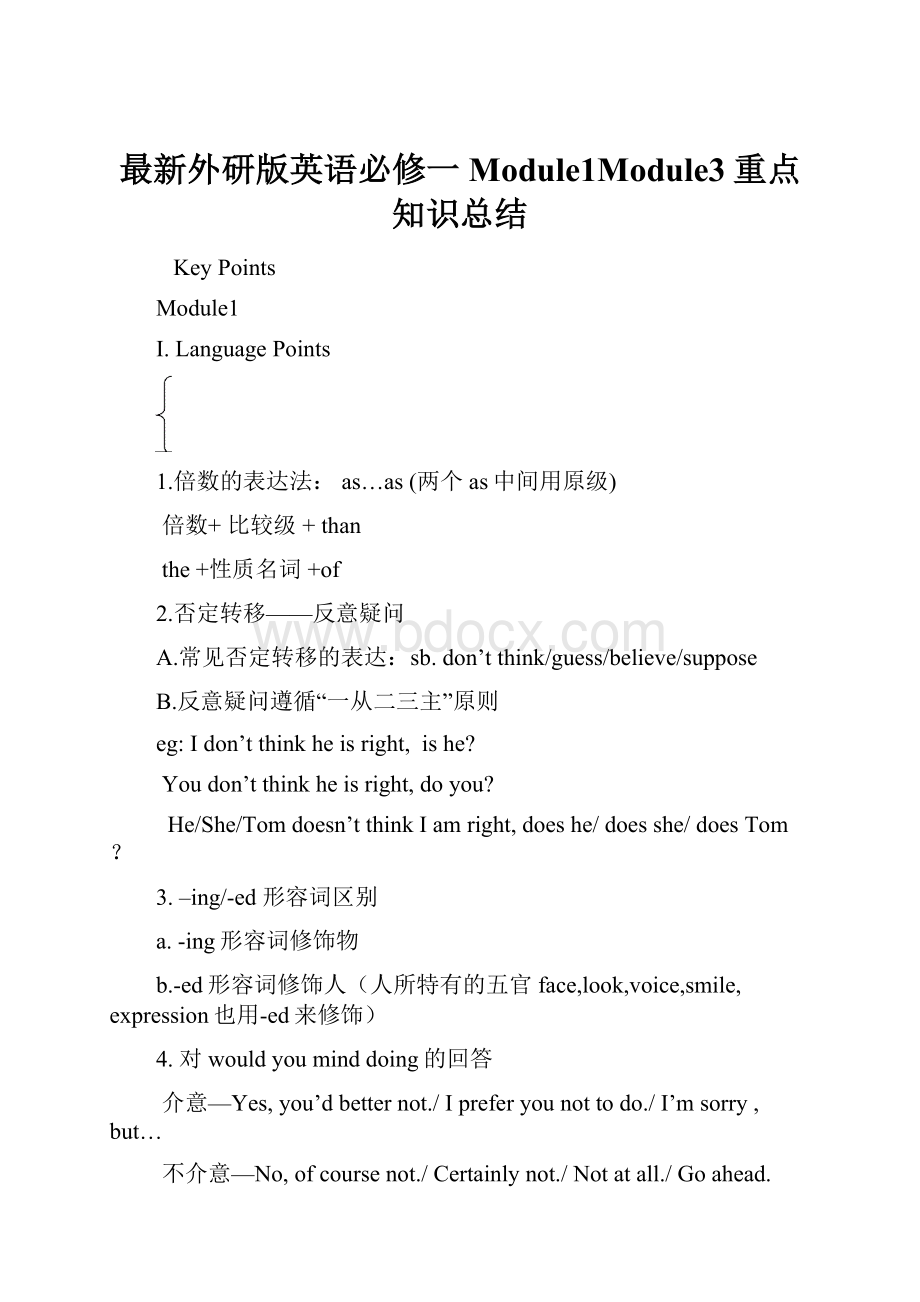最新外研版英语必修一Module1Module3重点知识总结.docx
《最新外研版英语必修一Module1Module3重点知识总结.docx》由会员分享,可在线阅读,更多相关《最新外研版英语必修一Module1Module3重点知识总结.docx(13页珍藏版)》请在冰豆网上搜索。

最新外研版英语必修一Module1Module3重点知识总结
KeyPoints
Module1
Ⅰ.LanguagePoints
1.倍数的表达法:
as…as(两个as中间用原级)
倍数+比较级+than
the+性质名词+of
2.否定转移——反意疑问
A.常见否定转移的表达:
sb.don’tthink/guess/believe/suppose
B.反意疑问遵循“一从二三主”原则
eg:
Idon’tthinkheisright,ishe?
Youdon’tthinkheisright,doyou?
He/She/Tomdoesn’tthinkIamright,doeshe/doesshe/doesTom?
3.–ing/-ed形容词区别
a.-ing形容词修饰物
b.-ed形容词修饰人(人所特有的五官face,look,voice,smile,expression也用-ed来修饰)
4.对wouldyouminddoing的回答
介意—Yes,you’dbetternot./Ipreferyounottodo./I’msorry,but…
不介意—No,ofcoursenot./Certainlynot./Notatall./Goahead.
5.倒装句——表情况相同
Shelikesdancing,sodoI.倒装句表情况相同
Shedoesn’tlikedancing,neitherdoI.
Shelikesdancing,soshedoes.—正常语序表“确实是这样”
6.takepartin/joinin/join/attend
A.takepartin参加群众性的、集体性的活动,例如takepartinschoolactivities/takepartintheOlympicGames
B.joinin参加正在进行的竞赛活动常用joinsb.(in)doing
C.join参加某个组织或团体,例如,jointheParty(共产党)/
jointheleague(共青团)/jointhearmy(参军)
D.attend正式用语,常指参加婚葬,会议,典礼,上学,上课等,例如,attendthewedding(婚礼)attendthefuneral(葬礼)attendclass(上课)attendschool(上学)
7.matter的用法
Itdoesn’tmatterif…如果…没关系
Doesitmatterif…如果…有关系吗?
Itmattersalotif…如果…很要紧
Ⅱ.KeyPhrases
atthestart/beginningof在…的开始/开端attheendof在…的末尾
attitudeto/towards对…的态度inotherwords换句话说
takepartin/join/joinsb.(in)doing/attend参加
dividesth.into=sth.bedividedinto把…划分为
moveto搬到…lookforwardtodoing期盼做某事
feel/get/beboredwith对…感到厌倦
beimpressedwith某人对…印象深刻
leaveadeepimpressionon/leaveanunforgettableimpressionon…给某人留下深刻印象/…给某人留下难忘的印象
用这种方式:
inthiswayinthismannerwiththismethodbythismeans
Ⅲ.Grammar——————一般现在时
1.经常性、习惯性动作用一般现在时
Shegoestoseethefilmonceaweek.
Healways/often/usually/sometimes/never/seldomtalkswithothers.
2.客观规律
Theteachersaidthattheearthtravelsaroundthesun.
Thelighttravelsfasterthansound.
3.在if引导的条件状语从句中,主句用将来时,从句用一般现在时,也就是“主将从现”
IwillgotoXi’anifitdoesn’traintomorrow.
主将从现
Ⅳ.EverdayEnglish
——Howareyoudoing?
=Howisitgoing?
某事进展的怎么样?
——Fine./Notbad.
Module2
Ⅰ.LanguagePoints
1.with的用法
A.with+宾语+adj./adv./介词短语
a.with+宾语+adj.
Don’ttalkwithyourmouthfull.
b.with+宾语+adv.
Theroomisbrightwithallthelightson.
c.with+宾语+介词短语
Ms.Liucomesintoclassroomwithabookinherhand.
B.with+宾语+V.(看宾语和动词之间的关系)
a.主动——ing
Themotherleft,withthebabycrying.
b.被动——done
Heissleepingwiththewindowclosed.
c.还没做
Withsomuchhomeworktodo,Ican’tgoout.
2.so…that…﹠sothat
A.so…that…如此…以致于…
SheexplainsEnglishgrammarsoclearthatevenIcanunderstandit.
B.sothat引导结果状语从句,译为“因此”
Mrs.Liujustsmiles,sothatyoudon’tfeelcompletelystupid.
3.appreciate的用法
A.appreciate(one’s)doing感激(某人)做某事
Iappreciateyourhelpingme.
B.Iwouldappreciateitif…如果…我将感激不尽
Iwouldappreciateitifyouhelpme.
4.admit的用法
A.admitdoing承认做了某事
Headmittedbreakingthewindow.
B.sb.beadmittedto/into被…录取或接收
Iwasadmittedto/intoPekingUniversity.
5.prefer的用法(preferring,preferred)
A.prefersth.更喜欢…
—Whichonedoyouprefer,theappleorthepear?
—Ipreferapple.
B.prefersthtosth.比起…更喜欢…
Ipreferappletobanana.比起香蕉我更喜欢苹果
C.preferdoingsth.todoingsth.比起做…更喜欢做…
Ipreferdancingtosinging.比起唱歌,我更喜欢跳舞
D.prefertodoratherthando宁愿…也不愿…
Ratherthantalkwithus,hepreferstoplayalone.
6.wouldrather的用法
A.wouldrather(not)do宁愿(不)做…
Iwouldratherstayathome.
B.wouldratherdothando宁愿做…也不愿…
Iwouldratherstayathomethangotoseethemovies.
Ⅱ.KeyPhrases
infact事实上fallasleep(fall的过去式是fell)睡着telljoks讲笑话(tell的过去式told)
makeprogress取得进步(progress不可数)makealotof/great/muchprogress取得巨大进步
asaresult结果asaresultof=becauseof由于
respectful=polite有礼貌的respectable体面的,正派的,值得尊敬的
bepatientwithsb.对某人有耐心
bepopularinsp.在某地受欢迎bepopularwithsb.在某个人群当中受欢迎
bestrictwithsb.insth.在某方面对某人要求严格
admitdoing承认做了某事sb.beadmittedto某人被…接收或录取
appreciateone’sdoing感激某人做某事Iwouldappreciateitifyou….如果…我将感激不尽
considerdoing考虑做某事nothinglike完全不像
makesb.dosth/sb.bemadetodo使某人做某事
preferdoingAtodoingB比起做A更喜欢做Bprefertodoratherthando宁愿做…也不愿做…
wouldrather(not)do宁愿(不)做…wouldratherdothando宁愿做…也不愿做…
haveproblemswithsth.在某方面有问题haveproblem/difficulty(in)doing做某事有困难
Ⅲ.Grammar
1.非限制性定语从句
A.标志:
“,”将主从句隔开
B.指人时,主语用who,宾语用whom
Heisadoctor,whoisinhisthirties.
Theoldmanhastwosons,oneofwhomisascientist.
C.指物只能用which(在限制性定语从句中既可用which也可用that来指物)
Thisisthehouse,whichIlivedintenyearsago.
D.指地点用where
Thisisthehouse,whereIlivedtenyearsago.
2.V.+doing/todo
A.只能接doing
admit/appreciate/avoid/consider/mind/lookforwardto/bebusy/begoodat+doing
B.既能接doing,又能加todo,doing表做过了,todo还没做要去做
remembertodo/doingforgettodo/doingstoptodo/doinggoontodo/doing
C.接doing与接todo时意义差别较大
trytodo努力尽量做trydoing尝试做
regrettodo对将要做的事感到抱歉regretdoing后悔做了某事
meantodo打算计划做某事meandoing意味着
sb.needtodo某人必须做某事sth.needdoing某物需要…
can’thelpsb.todo不能帮某人做某事can’thelpdoing情不自禁
Ⅳ.EverydayEnglish
Haveyougotthat?
你听说了吗?
/你明白了吗?
It’suptoyou.由你决定That’ssettled.就这么定了
Take/Havealookat…看一看…acoupleofthings两三件事情
Module3
Ⅰ.LanguagePoints
1.geton/off﹠getinto/outof﹠takeoff
geton/off上下(bus,train,plain,ship)getinto/outof上下(taxi,car)takeoff:
起飞;脱掉
2.so﹠such
A.sobeautifulagirl/suchabeautifulgirl
B.such+可数名词复数/不可数名词
suchlittlechildren/suchgreatprogress(suchlittle:
这么小)
C.somany/much/little
somany+可数名词复数“如此多”eg:
somanystudents
somuch+不可数名词“如此多”eg:
somuchmoney
solittle+不可数名词“如此少”eg:
solittlefood
3.referto的多层含义(refer过去式referred)
A.参考,查阅
Forfurtherinformation,youcanrefertothewebsiteofourcompany.
B.提到,涉及
Whenshesaidsomeonewasstupid,I’mshedidn’trefertome.
C.归功于
Hereferredhissuccesstothegoodeducationhehasreceived.
D.适用于
Thesebooksreferstostudentsunder10yearsold.
Ⅱ.KeyPhrases
beshortfor…的缩写或简称atmidnight在午夜
outofdate过期的,过时的ataspeedof以…的速度
therestof剩余的/其他的…forthefirsttime平生第一次
playwith和…玩allthetime一直,总是
Ⅲ.Grammar——过去分词作后置定语﹠插入语
1.动词过去分词做后置定语:
done,tobedong,beingdone可以做后置定语修饰一个名词
eg.Thequestiondiscussedatthemeetingyesterday昨天在会上讨论的问题
Thequestionbeingdiscussedatthemeetingnow会议上正在讨论的问题
Thequestiontobediscussedatthemeetingtomorrow明天会上将被讨论的问题
2.插入语:
在一个句子中间插入的一个成分,它不作句子的任何成分,可有可无。
常见的插入语有:
doyouthink/believe/guess/suppose,插入语最大的特点是后接陈述句
eg:
Whodoyouthinkyouare?
Whatdoyouguessshelikes?
Whendoyousupposeweshouldsetoff(出发)?
Wheredoyouthinkwecango?
Attention:
划线处都应为陈述句
Module4
Ⅰ.LanguagePoints1
1.bemadeof﹠bemadefrombemadeinbemadeupof
A.bemadeof由…制造(可以看出原材料)eg:
Thewritingtableismadeofwood.
B.bemadefrom由…制造(看不出原材料)eg:
Thepaperismadefromwood.
C.bemadein……地方制造eg:
BYD(比亚迪)ismadeinChina.
D.bemadeupof由…构成/组成eg:
Abasketballteamismadeupoffivemembers.
2.approach的用法
A.作为vt.(及物动词)意为“接近,靠近”,后直接跟所接近的东西
eg:
Thedogapproachedthegardenwhenthegirlranout.
B.作为n.意为“方式,方法”,后常跟介词to,构成approachtodoing句型
eg:
Atthemeeting,theydiscussedthreedifferentapproachestosolvingtheproblem.
3.population的用法
A.“询问某地有多少人口”-----Whatisthepopulationof+sp.(某地)?
eg:
WhatisthepopulationofYichuan?
B.“回答某地有多少人口”-----sp.hasapopulationof+具体数字.
eg:
Yichuanhasapopulationof2000,000.
C.修饰人口的多少用large或small
eg:
Chinahasthelargestpopulationintheworld.
D.当全部人口作主语时,谓语动词用单数;当部分人口作主语时,谓语动词用复数
eg:
ThepopulationofChinaislargerthanothercountries.(全部人口作主语,谓语动词用单数)
eg:
About80﹪ofChinesepopulationarepeasants.(农民)(部分人口作主语,谓语动词用复数)
4.afford的用法
sth.
can/can’t/beableto/benotabletoafford意为“能够/不能支付得起”
todosth.
eg:
Icanaffordthiscoat.=Icanaffordtobuythiscoat.
5.“许多大,大量的”
A.+可数名词复数:
manyagood/greatmanyalarge/greatnumberof谓语动词用复数
Thereareagreatmanybooksinourschool’slibrary.
Anumberofteachersinourschoolaremen.
B.+不可数名词:
muchagreatdealofalargeamountof谓语动词用单数
Agreatdealofwaterinourcityiswastedeveryyear.
Alargeamountofmoneywaslost.
C.+两可:
alotof=lotsofplentyof(这两个短语作主语时谓语动词形式依据名词是否可数来确定)
alargequantityof(作主语,谓语动词用单数)
largequantitiesof(作主语,谓语动词用复)
Alotofstudentsinthisschoolhavepassedtheexam.(后接了可数名词复数,所以谓语动词用复数)
Lotsoffoodiseatenbytheguests.(客人)(后接了不可数名词,所以谓语动词用单数)
Alargequantityofmilkiswasted.(alargequantityof作主语,谓语动词用单数)
Largequantitiesofmilkarewasted.(largequantitiesof作主语,谓语动词用复数)
6.多个形容词作主语时的顺序:
“限冠形龄颜国材”
TenstrongyoungChinesestudentsaretakingpartintheboatrace.
7.半系动词:
包括5个感官动词(look,sound,smell,taste,feel);remain;keep最大特点:
后接形容词,无进行於被动语态。
The100-year-oldarchitecturestillremainsnew.
7.“…怎么样”Howis…=Whatis…like?
“你认为…怎么样”Howdoyoulike/findsth.?
=Whatdoyouthinkofsth.?
eg:
Howistheweather?
=Whatistheweatherlike?
Howdoyoulike/findChina?
=WhatdoyouthinkofChina?
注意:
回答时不用yes或no
(二)大学生对DIY手工艺品消费态度分析Ⅱ.Grammar-----现在完成时:
havedone
完成时态常用固定句式:
1.这是某人第几次做某事It/This/Thatisthe+序数词+time(that)sb.have/hasdonesth.
eg:
ItisthefirsttimethatIhavevisitedChina.
附件
(一):
注意:
当is变为was时,have要相应的变为had
eg:
ItwasthefirsttimethatIhadvisitedChina.
(二)创业优势分析
2.
3.情感性手工艺品。
不少人把自制的手机挂坠作为礼物送给亲人朋友,不仅特别,还很有心思。
每逢情人节、母亲节等节假日,顾客特别多。
自从…以来已有一段时间了Itis/Ithasbeen+一段时间+since从句,从句通常用一般过去式
eg:
Itissixyearssincewesaweachotherlastyear.
1、现代文化对大学生饰品消费的影响
4.
5.大学生个性化消费